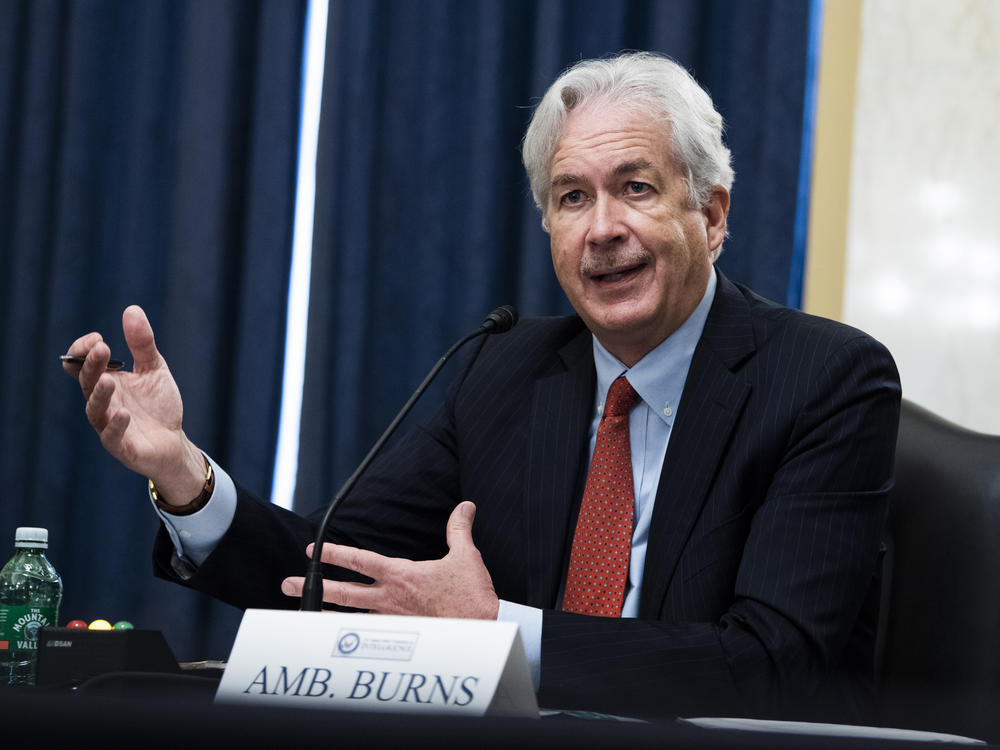Section Branding
Header Content
CIA Nominee William Burns Talks Tough On China
Primary Content
President Biden's nominee to lead the CIA, William Burns, spent more than three decades as a diplomat. Yet Burns sounded very much like a national security chief at his confirmation hearing Wednesday as he described how the U.S. should be wary of China and its leader Xi Jinping.
"There are a growing number of areas in which Xi's China is a formidable, authoritarian adversary," Burns told the Senate Intelligence Committee in his opening remarks.
He said China was working to "methodically strengthen its capabilities to steal intellectual property, repress its own people, bully its neighbors, expand its global reach and build influence in American society."
Democratic and Republican senators supported Burns' assessment, and many praised Burns for his long career at the State Department, which included stints as ambassador to Russia and to Jordan, as well as top jobs in Washington.
Burns, 64, would be the first career diplomat to lead the CIA and his confirmation would largely complete President Biden's national security team.
Building consensus on China
When pressed for details on China, he said the U.S. needed to prepare for challenges that would last decades.
"I think the evolutions of Xi Jinping's China over the last six or seven years has been a very sharp wake-up call," Burns said. "The kind of aggressive, undisguised ambition and assertiveness I think has made very clear the nature of the adversary and the rival that we face today."
Burns said it was critical for the U.S. to develop a long-term consensus on how to approach China. So far, the Biden administration has indicated it plans to take a tough line on many issues — as did the Trump administration — though Biden's team says it will work much more closely with American allies.
"We have to buckle up for the long haul in competition with China," Burns added. "This is not like the competition with the Soviet Union in the Cold War, which was primarily in security and ideological terms. This is an adversary that is extraordinarily ambitious in technology and capable in economic terms as well."
Regarding Russia, Burns described the country as a "declining power," but said President Vladimir Putin has consistently proven he can be a disruptive force even when playing a relatively weak hand.
"Most of the white hair came from my service in Russia over the years, and in particular, dealing with Vladimir Putin's Russia," said Burns, the U.S. ambassador in Moscow from 2005-8. "What I've learned is that it's always a mistake to underestimate Putin's Russia."
Back channel talks with Iran
Burns helped launch secret nuclear talks with Iran, though he retired from the State Department before the deal was reached in 2015. The Trump administration pulled out of that agreement, while the Biden administration is looking to return to it.
In nominating top national security advisors, Biden has chosen experienced hands he worked with previously when he was vice president. Several were in the No. 2 positions during that period and are now being elevated to leadership roles after being out of government during Trump's tenure.
Burns had the no. 2 job at the State Department when he retired in 2014. He's been leading the Carnegie Endowment for International Peace in Washington since leaving government.
Avril Haines, who served as the CIA's deputy director under former President Barack Obama, is now the director of national intelligence. Tony Blinken, the deputy secretary of state under Obama, is Biden's secretary of state. Jake Sullivan, who served as national security adviser to Vice President Biden, is now national security adviser to President Biden.
Copyright 2021 NPR. To see more, visit https://www.npr.org.

